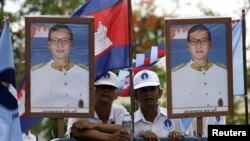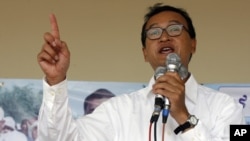BANGKOK —
Thailand has denied entry to Cambodian opposition leader Sam Rainsy out of concern it could upset Cambodian authorities ahead of a July election.
Rainsy, who lives in France, was scheduled to launch his autobiography at the Foreign Correspondents Club of Thailand (FCCT) but, the Ministry of Foreign Affairs told immigration he was not allowed to enter Thailand.
Manasvi Srisodapol, director general of the ministry's information department, acknowledged that Rainsy has been allowed into Thailand in the past. The opposition leader spoke at the FCCT in 2009 at a press event titled “Cambodia's Deteriorating Environment for Free Expression and Democracy." But he says with the timing of Cambodia's election, Thailand did not want to get "pulled into the political campaign" in a neighboring country.
"The Thai authorities concerned deemed that such a visit with such activity has a political motive against a neighboring country and is timed especially during an approaching election in that neighboring country," Manasvi said. "Accordingly, the Thai Ministry of Foreign Affairs has requested immigration department to ban Mr. Sam Rainsy's entry into Thailand."
According to Manasvi, Rainsy was informed a few months ago that he would not be allowed to conduct political activities in Thailand. He cited both the book launch and Rainsy's plans to meet with journalists as being political in nature.
The book, titled "We Didn't Start the Fire: My Struggle for Democracy in Cambodia," tells Rainsy's decades-long story of fighting against abuse of power and corruption in the country.
Rainsy has lived in self-imposed exile since 2005 to avoid prison in Cambodia for charges he says are politically motivated. He was banned from the July election, but his Cambodia National Rescue Party will take part.
Prime Minister Hun Sen has threatened the country could devolve into civil war if his ruling Cambodian People's Party loses the election. Cambodian activists say the National Election Committee is passing unfair rules and warn if the election is not credible the government could lose public trust.
Manasvi rejected suggestions that Cambodian authorities may have urged the ban and says Thailand respects individual rights.
"But at [the] same time, [we]cannot allow individuals to take any activities that are deemed detrimental to a friendly country or that may affect Thailand's interests as well as cause damage to individuals, other individuals," he said.
Nationalist Thai governments of the past have had poor relations with Cambodia, notably over disputed border territory. Thai Prime Minister Yingluck Shinawatra revived warm ties with Cambodia established by her brother, former Prime Minister Thaksin Shinawatra.
But Manasvi said the improved relations have nothing to do with the decision, which he called one of standing policy and in line with the charter of the Association of Southeast Asian Nations.
"And, this is also reflected in..as a principle, one of the cardinal principles of ASEAN, that members states should not allow third parties to use that country, the member state, as a venue to launch political or activities that threaten the political stability or economic stability of another member state," Manasvi added.
Rainsy is welcome to visit Thailand any time for a personal trip, he said, but authorities would not consider allowing him in for a book launch, or similar activity, until after Cambodia's July election.
Rainsy, who lives in France, was scheduled to launch his autobiography at the Foreign Correspondents Club of Thailand (FCCT) but, the Ministry of Foreign Affairs told immigration he was not allowed to enter Thailand.
Manasvi Srisodapol, director general of the ministry's information department, acknowledged that Rainsy has been allowed into Thailand in the past. The opposition leader spoke at the FCCT in 2009 at a press event titled “Cambodia's Deteriorating Environment for Free Expression and Democracy." But he says with the timing of Cambodia's election, Thailand did not want to get "pulled into the political campaign" in a neighboring country.
"The Thai authorities concerned deemed that such a visit with such activity has a political motive against a neighboring country and is timed especially during an approaching election in that neighboring country," Manasvi said. "Accordingly, the Thai Ministry of Foreign Affairs has requested immigration department to ban Mr. Sam Rainsy's entry into Thailand."
According to Manasvi, Rainsy was informed a few months ago that he would not be allowed to conduct political activities in Thailand. He cited both the book launch and Rainsy's plans to meet with journalists as being political in nature.
The book, titled "We Didn't Start the Fire: My Struggle for Democracy in Cambodia," tells Rainsy's decades-long story of fighting against abuse of power and corruption in the country.
Rainsy has lived in self-imposed exile since 2005 to avoid prison in Cambodia for charges he says are politically motivated. He was banned from the July election, but his Cambodia National Rescue Party will take part.
Prime Minister Hun Sen has threatened the country could devolve into civil war if his ruling Cambodian People's Party loses the election. Cambodian activists say the National Election Committee is passing unfair rules and warn if the election is not credible the government could lose public trust.
Manasvi rejected suggestions that Cambodian authorities may have urged the ban and says Thailand respects individual rights.
"But at [the] same time, [we]cannot allow individuals to take any activities that are deemed detrimental to a friendly country or that may affect Thailand's interests as well as cause damage to individuals, other individuals," he said.
Nationalist Thai governments of the past have had poor relations with Cambodia, notably over disputed border territory. Thai Prime Minister Yingluck Shinawatra revived warm ties with Cambodia established by her brother, former Prime Minister Thaksin Shinawatra.
But Manasvi said the improved relations have nothing to do with the decision, which he called one of standing policy and in line with the charter of the Association of Southeast Asian Nations.
"And, this is also reflected in..as a principle, one of the cardinal principles of ASEAN, that members states should not allow third parties to use that country, the member state, as a venue to launch political or activities that threaten the political stability or economic stability of another member state," Manasvi added.
Rainsy is welcome to visit Thailand any time for a personal trip, he said, but authorities would not consider allowing him in for a book launch, or similar activity, until after Cambodia's July election.





